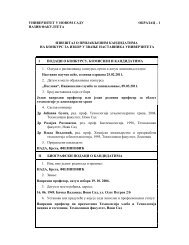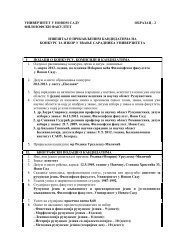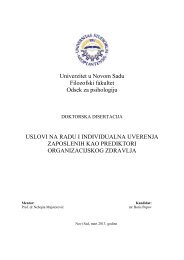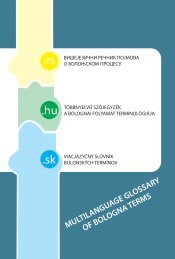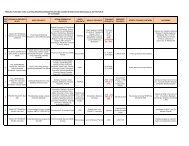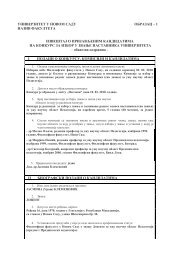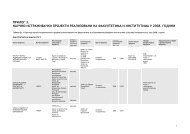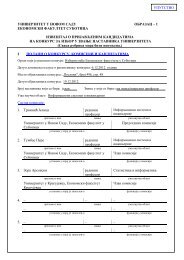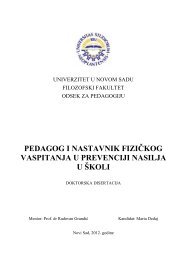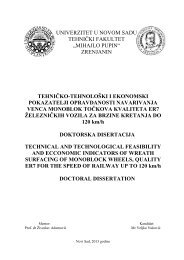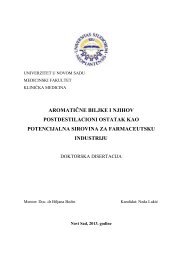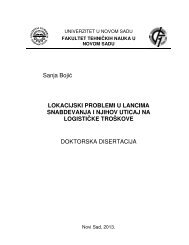Intercultural competence as an aspect of the communicative ...
Intercultural competence as an aspect of the communicative ...
Intercultural competence as an aspect of the communicative ...
Create successful ePaper yourself
Turn your PDF publications into a flip-book with our unique Google optimized e-Paper software.
introducing or teaching ICC in l<strong>an</strong>guage cl<strong>as</strong>ses. In that way learners would learn not to<br />
use or rely on <strong>the</strong> linguistic resources <strong>of</strong> <strong>the</strong>ir own culture which inevitably leads to<br />
negative judgments <strong>an</strong>d pragmatic failure (Nelson et al. 2006).<br />
Finally, both in-service <strong>an</strong>d especially pre-service teachers should become<br />
acquainted with <strong>the</strong> ICC teaching tools, <strong>of</strong> which <strong>the</strong> culture <strong>as</strong>similator is only one, <strong>an</strong>d<br />
try to incorporate <strong>the</strong>m into <strong>the</strong>ir teaching practice, in that way combining IC, pragmatic,<br />
sociolinguistic, <strong>an</strong>d linguistic elements.<br />
6.3. Limitations<br />
As o<strong>the</strong>r authors have noticed (Richards 2003; Lincoln <strong>an</strong>d Guba 1985), <strong>the</strong>re is a<br />
difficulty in doing a qualitative study <strong>an</strong>d maintaining a bal<strong>an</strong>ce between uniqueness <strong>of</strong><br />
particular findings <strong>an</strong>d <strong>the</strong> relev<strong>an</strong>ce <strong>of</strong> <strong>the</strong> study for a wider setting. Fur<strong>the</strong>r, this study<br />
had a ra<strong>the</strong>r limited number <strong>of</strong> particip<strong>an</strong>ts, which might be one <strong>of</strong> <strong>the</strong> limitations. As it<br />
h<strong>as</strong> been mentioned, Lincoln <strong>an</strong>d Guba (1985) propose tr<strong>an</strong>sferability <strong>as</strong> a more suitable<br />
concept th<strong>an</strong> generalisation, that is, <strong>the</strong> research should provide enough information to<br />
o<strong>the</strong>r researchers so that <strong>the</strong>y ‘share in <strong>the</strong> researcher’s underst<strong>an</strong>dings’ (Richards 2003:<br />
26). This study aims to do so through content <strong>an</strong>alysis <strong>an</strong>d thick description, tri<strong>an</strong>gulated<br />
with qu<strong>an</strong>titative data, researcher’s notes <strong>an</strong>d English l<strong>an</strong>guage courses syllabi.<br />
Ano<strong>the</strong>r limitation is <strong>the</strong> fact that <strong>the</strong> students volunteered for <strong>the</strong> interviews,<br />
<strong>the</strong>refore making <strong>the</strong> sample a purposive r<strong>an</strong>dom sample. The re<strong>as</strong>on for this w<strong>as</strong> <strong>the</strong> fact<br />
that <strong>the</strong> researcher had a limited amount <strong>of</strong> time to spend in <strong>the</strong> cl<strong>as</strong>sroom due to <strong>the</strong> time<br />
constraints <strong>of</strong> English l<strong>an</strong>guage teachers <strong>an</strong>d dem<strong>an</strong>ds <strong>of</strong> students’ courses. Therefore,<br />
sifting <strong>the</strong> qu<strong>an</strong>titative data for purposeful sample w<strong>as</strong> impractical. Moreover, <strong>the</strong><br />
students were not given <strong>an</strong>y compensation for <strong>the</strong>ir participation, <strong>an</strong>d were not too willing<br />
to take part. Therefore, even org<strong>an</strong>izing <strong>the</strong>se two ph<strong>as</strong>es sequentially might not have<br />
given <strong>the</strong> researcher <strong>the</strong> particip<strong>an</strong>ts for <strong>the</strong> second, qualitative, stage due to <strong>the</strong><br />
unwillingness <strong>of</strong> students to participate. However, this qualitative sample gave a needed<br />
r<strong>an</strong>domness to <strong>the</strong> study <strong>as</strong> it cut across all <strong>the</strong> departments included in <strong>the</strong> qu<strong>an</strong>titative<br />
stage.<br />
Such a sample may seem <strong>as</strong> too narrow for a purposeful generalisation, however,<br />
<strong>the</strong> very setting <strong>of</strong> a higher education makes <strong>the</strong> research narrow in nature. Generalisation<br />
to o<strong>the</strong>r groups <strong>of</strong> learners without formal education would not be viable. On <strong>the</strong> o<strong>the</strong>r<br />
h<strong>an</strong>d, this group <strong>of</strong> students may well share <strong>the</strong> characteristics with some o<strong>the</strong>r,<br />
international students, <strong>the</strong>refore making generalisations in that sense possible.<br />
232



